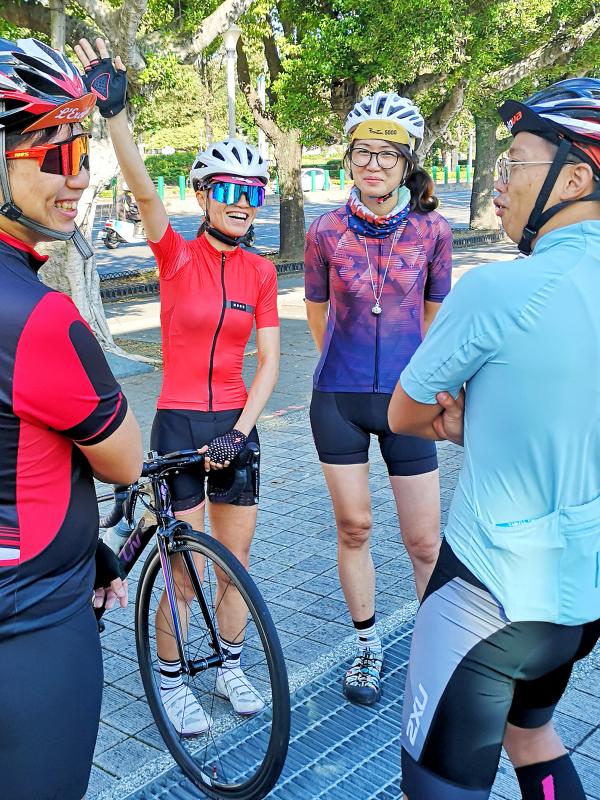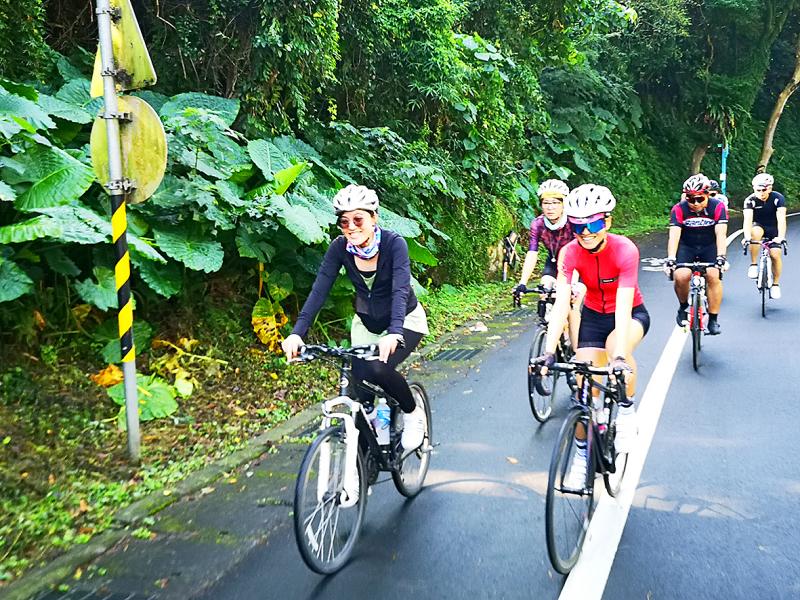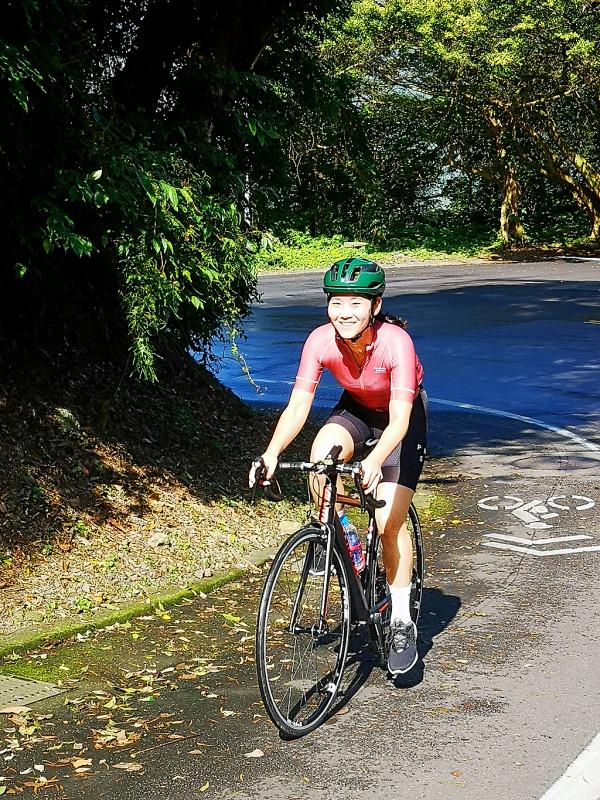“There are lots more female cyclists in Taiwan now there used to be,” says Lucy Hsieh (謝雅惠). “But there are still vastly more male than female cyclists.”
I try to make a joke, something about her lass being half empty, but it is either over her head or, more likely, beneath her contempt. I decide to be more sympathetic. Less male. Why does she think more women don’t cycle?
Hsieh suggests that I try to think from the viewpoint of a woman.

Photo: Mark Caltonhill
I try. She waits … before finally helping me out with a few possible reasons:
“One: Women’s muscle endurance is inherently inferior to that of men.”
I want to interject that this is possibly not true. I mean, I was overtaken by plenty of women cyclists in the closing stages of this year’s King of Mountains and Ironman races, just when I could have most used some “endurance.”

Photo: Mark Caltonhill
But thinking about Taiwan’s sporting culture, or relative lack of it, just at the age when I was doing after-school training in the evenings and participating in cross-country races on Saturdays back in the UK, is when most local teenagers are going to cram schools or doing catch-up lessons. But surely this applies to boys as much as to girls?
“Two: Beginner cyclists tend to ride alone for a long time before they dare to participate in a group,” she says, suggesting that women worry more about not being able to keep up and making other riders wait for them.
Okay, male lack of self-awareness is a thing, granted.

Photo: Mark Caltonhill
Three: “Women need to use the bathroom more frequently during their menstrual period so cannot cycle too far into the countryside.”
LAST PEOPLE RIDING

Photo: Mark Caltonhill
Hsieh, along with husband Tony Cheng (鄭任峰), is leader of the Cycling Cats (貓騎單車社), an ad hoc social-media-based group of bikers, which, although it sounds kind of feminine, turns out to have been started a decade ago by a bunch of male Chinese Culture University (中國文化大學) friends: Max Hu (胡哲維), Li Bo-tsun (李柏村), Lin Chun-hung (林俊宏; a.k.a. Brother Springtime 春哥) and Lin Chu-hsuan (林鉅桓; better known as Black Ghost 黑鬼).
Cheng met Hu on his first round-island ride (環島), Hsieh joined later and, after the founders had drifted off to do other sports or raise families, they became the group’s leaders by default. They have no children themselves but, by coincidence, do have a cat.
I track down Max Hu on Facebook.
Yes, he was one of the founders and yes they have all pretty much given up. Personally, he’d had “a beef with the bike industry.”
I ask him why “Cats” and he sends back a picture of a panda. This throws me for a moment until I remember that the Chinese for panda is “cat-bear” (貓熊) or a “bear-cat” (熊貓).
The Cats ride together a couple of times each month. When it’s not raining. Or when the sun is out.
That’s the fourth reason many women don’t like cycling in Taiwan, Hsieh says. “They don’t want to get a tan.”
Now I suspect she’s teasing me.
“And we’re not really the leaders,” she says, pointing out that anyone in the group is free to suggest a route and lead the ride. But, reason number five: “Women’s sense of direction isn’t good, so it’s better for someone to show us the way.”
At which point I know she’s mocking me, especially after she starts sniggering.
Most of the group’s rides are led by Hsieh or Cheng, however, with the others bringing up the rear to encourage the beginners not to give up. In fact, the Cats have an informal rule whereby, whenever the front riders get to the top of a hill, they go back to the last rider and repeat part of the climb.
ALL ABOUT THE HILLS
Ascending is a lot of what Cycling Cats’ cycling is about. Not steep hills or long hills but, knowing that many novice cyclists have a block about climbing and, often more intensely, a fear of descending, they try to include several hills on their excursions in the Yangmingshan (陽明山), Wulai (烏來) or Pingsi (平溪) areas.
Hsieh remembers her own first rides in 2013, on a mountain bike almost exclusively along Taipei’s flat riverside bike paths. Only once she’d borrowed a road bike and started climbing did she become obsessed with cycling.
“It was like switching to the sports car of the cycling world,” she says.
It is this obsession she’s keen to share with other riders. Not just women, though in fact, between 40 and 60 percent of the riders have been women on the days I’ve met the Cats when riding on local hills. And they’re usually a good-sized group; always over a dozen and sometimes two dozen, so they’re obviously doing something right.
“Women are not good at repairs,” Hsieh offers as reason number six for their disinclination to ride bicycles.
She’s presumably unaware that most of us men are not good at repairs either. In fact, the first thing many male cyclists do when suffering “a mechanical,” even something as innocuous as a flat tire, is to call Uber to take them to the nearest bike shop.
Such behavior is not encouraged among the Cats, and novices are taught or helped or taught-by-helping to fix punctures and other recurrent problems. Experiences relating to everything from bikes and components to shoes and clothing are shared too.
What you’re unlikely to hear are discussions of NT$300,000 bikes and NT$100,000 wheels; more likely someone will know someone who can trade you a second-hand seat post or lend you a helmet. Their ethos is helping people get started without cashing in their savings
If they really fall in love with cycling, they can spend more money later and do more adventurous rides. Like Hsieh herself, who participates in some organized events, such as the 160km-long Tour of Taipei race (環大台北160K), and Liv-sponsored Women’s ‘Sword in the Wind’ event (Liv女子風中劍). She’s more enthusiastic about self-challenges on Taiwan’s “classic routes,” however, like the 3275m-high Wuling (武嶺) climb and 1050km-long round-island ride, when she can go at her own pace and stop to appreciate the scenery.
Is this another attribute of women cyclists? Certainly the Cats do like to stop and take a lot of group selfies whenever there’s a half-decent view to pose in front of.
They also stop frequently for coffee and cake. Or coffee and ice-cream. Or waffles. Women may or may not have a good sense of direction, but they seem to know their way to the best refreshments.
Mark Caltonhill bikes, and writes, and writes about bikes.

Most heroes are remembered for the battles they fought. Taiwan’s Black Bat Squadron is remembered for flying into Chinese airspace 838 times between 1953 and 1967, and for the 148 men whose sacrifice bought the intelligence that kept Taiwan secure. Two-thirds of the squadron died carrying out missions most people wouldn’t learn about for another 40 years. The squadron lost 15 aircraft and 148 crew members over those 14 years, making it the deadliest unit in Taiwan’s military history by casualty rate. They flew at night, often at low altitudes, straight into some of the most heavily defended airspace in Asia.

Many people in Taiwan first learned about universal basic income (UBI) — the idea that the government should provide regular, no-strings-attached payments to each citizen — in 2019. While seeking the Democratic nomination for the 2020 US presidential election, Andrew Yang, a politician of Taiwanese descent, said that, if elected, he’d institute a UBI of US$1,000 per month to “get the economic boot off of people’s throats, allowing them to lift their heads up, breathe, and get excited for the future.” His campaign petered out, but the concept of UBI hasn’t gone away. Throughout the industrialized world, there are fears that

Like much in the world today, theater has experienced major disruptions over the six years since COVID-19. The pandemic, the war in Ukraine and social media have created a new normal of geopolitical and information uncertainty, and the performing arts are not immune to these effects. “Ten years ago people wanted to come to the theater to engage with important issues, but now the Internet allows them to engage with those issues powerfully and immediately,” said Faith Tan, programming director of the Esplanade in Singapore, speaking last week in Japan. “One reaction to unpredictability has been a renewed emphasis on

Taiwan’s democracy is at risk. Be very alarmed. This is not a drill. The current constitutional crisis progressed slowly, then suddenly. Political tensions, partisan hostility and emotions are all running high right when cool heads and calm negotiation are most needed. Oxford defines brinkmanship as: “The art or practice of pursuing a dangerous policy to the limits of safety before stopping, especially in politics.” It says the term comes from a quote from a 1956 Cold War interview with then-American Secretary of State John Foster Dulles, when he said: ‘The ability to get to the verge without getting into the war is